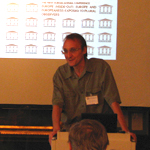“European Miracle”: Warrior Aristocrats, Libertarian Spirit, and Competition as Discovery Process
-
-

-
Presentation speakers
- Andrei Znamenski, The University of Memphis
Abstract:
Scholars noted that one of the characteristic aspects of European political identity is the existence of horizontal relationships among autonomous individuals and polities. In his recent book The Uniqueness of Western Civilization (Brill, 2011), Ricardo Duchesne makes an ambitious attempt to trace the origin of this tradition, locating it in a peculiar warrior aristocratic ethos of ancient Indo-European people. In my critical review of Duchesne scholarship, I stress a necessity of a comparative analysis of European and non-European societies that carried a similar ethos in order to validate such broad and sweeping argument. Also, agreeing with Duchesne about an active role of human agency in history, I question the theoretical sources he uses to build up his thesis. I suggest that Friedrich von Hayek’s concept of spontaneous order and his approach to human knowledge (“competition as discovery process”) might help us explain better the gradual advance of creativity in a few geographical pockets of Europe and eventual rise of European hegemony. -
Related Presentations

From Universalism To Regionalism: Europeanization And Its Reflections Upon Turkey
- Cemile Arikoglu Unducu

Europe And Its “Accursed“ Share
- Dana Domsodi

Development Of Environmental Infrastructure In The EU: Possibilities For Evaluation
- Jurijs Spiridonovs

A European Affair: The Role Played By The EC In The Spanish Transition To Democracy
- Alan David Granadino Gonzalez


















